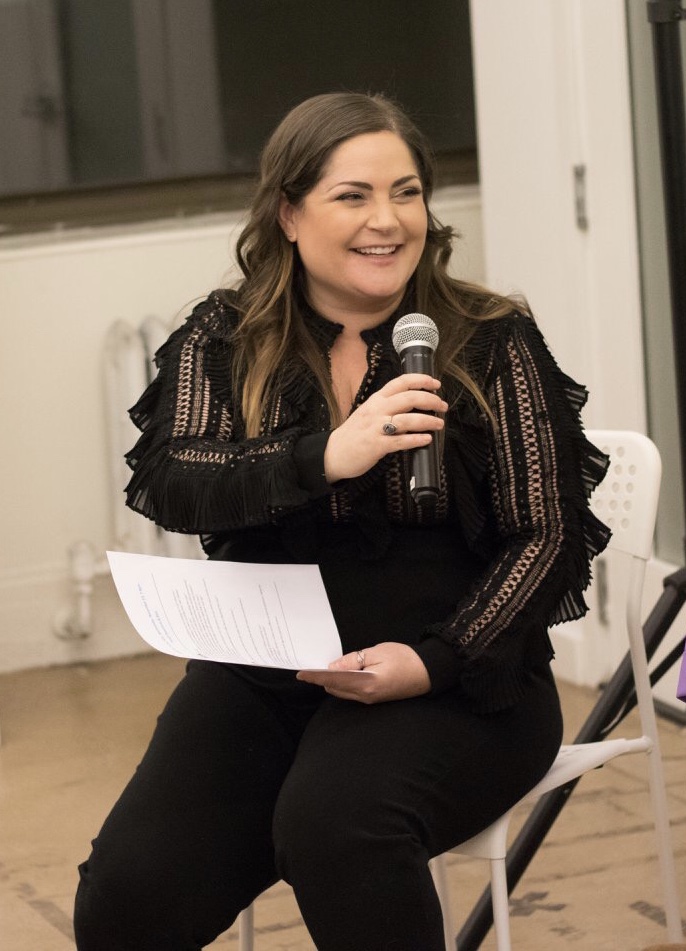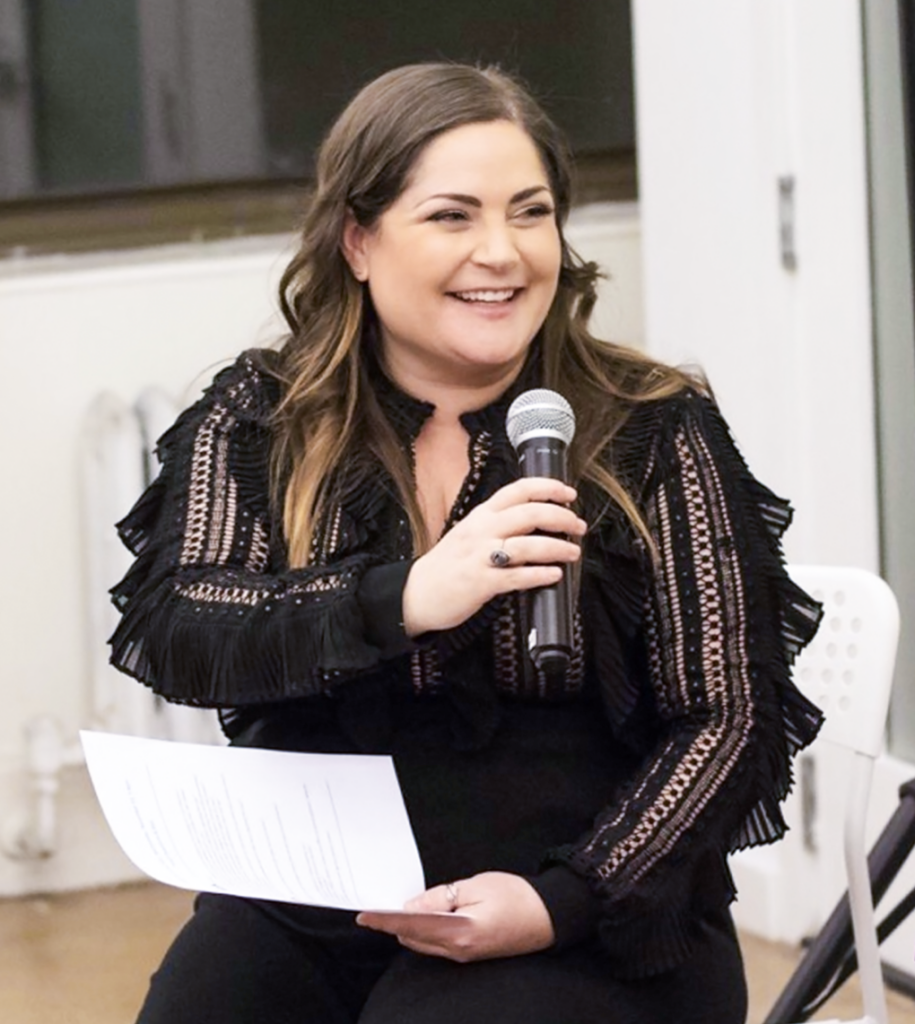Jessy Grossman: Hey guys. Welcome back to the WIIM Podcast. You’ve got me, Jesse Grossman, your host, and founder of the Women and Influencer Marketing Community. If you have not joined our membership yet, you’re just missing out. We have so much coming. We have so many announcements to make, and there’s just like so much buzz and excitement happening in the group, like the core of it.
It’s all of our members, and I just want you to meet all of the incredible women who are in the group that I have been fortunate enough to meet and learn from and just grow from. I’m privileged, honestly to know the women that are in the group. It’s like the most incredible supportive thing. So if you’re like into the conversations that we have here I highly encourage you to check out the membership ’cause it’s just, it’s this on steroids.
It’s the best. I can’t promise you that enough. This week we’re gonna have such an interesting conversation, so I know that I’ve been sharing with you guys my journey to becoming an event planner. I don’t fancy myself one. However, we’ve produced so many live events. This year, which we started at the end of last year certainly we hosted live events pre covid, but post Covid.
And during Covid, we took a break. Everything was virtual. and so with the world opening up, the world is officially opened up. Right. And we just. Thought that people were itching for that in-person comradery and experiences again. And we also think that there’s nothing more powerful than in-person networking, which is what we’re all about.
So we’ve been hosting a ton of in-person stuff, and I wanted to not just tell you guys, yeah, the events went awesome. They were fun. I wanted to give you guys some learnings, things that I have very much learned and struggled to sort through about what. You have to do this to produce a successful live event.
You guys are marketers or you guys are business owners, and live events are just a really, really powerful thing, but they are not easy at all whatsoever. Learned a lot. So stick around. This is gonna be an entire episode solely dedicated to how to host a successful live event.
Jessy Grossman: All right, you guys. So I can officially call myself an event planner with all of the events that we’ve produced this year for Wim. Real talk though, you guys. Events are a beast. And honestly, it’s like whether you’re producing an event for five people or a hundred plus people or a thousand people, it’s hard.
They are so hard. But I’ve learned a lot and I just wanna teach you guys what I’ve learned. So hopefully you can avoid making. The mistakes and missteps that I’ve made along the way. So I’m bringing you, I’m looking at my list, 1, 2, 3, about six or seven items.
Leave Additional Time
Jessy Grossman: My top learnings of how to produce a successful event.
So item number one. Whew. This is a good thing to start with. Leave additional time. You guys, you are not gonna be able to produce an event in a month, not even two or three, and probably basically leave more time than you think that you’ll need. You’ll need more time to set up. You’ll need more time to plan.
You’ll just need more time. So either add an hour. Or a week or a month more to all timelines because it will benefit you in the long run. All right.
Create Repeatable Systems
Jessy Grossman: Item number two, A thing that I’ve learned, create repeatable systems. Even if you think that this is gonna be a one-off event, the goal is that it’s so successful that you’ll have another one right?
For us. We’re producing events in New York, la, and Chicago. We hope to go to other cities. We hope to come back to those cities and so, Like, have your future self, thank you. Because you’re creating repeatable systems that should theoretically make every subsequent event easier than the last. So how do you do that?
You know, keep track of all your vendors if you have, if you happen to find a fantastic photographer or happen to find a fantastic videographer, keep their information all in one place. For me, I create a Google Doc. To organize me, which is another item that I’m going over with you guys today.
But I keep track of all of my vendor’s notes galore, and basically, I’m just creating anything that can be repeated for the next event because each additional one should get easier and easier. And I know again, you might be thinking this is just meant to be a one-off event, But I would challenge you on that, right? Like, why is it gonna just be one event? Shouldn’t it be successful enough to have another one? So, create repeatable systems, and your future self will. Thank you.
Account for Mix-ups
Jessy Grossman: Account for mix-ups, you guys. My anxiety levels diminished tremendously as soon as I approached my events knowing that shit was gonna go wrong, shit. Always goes wrong with events so, Even with all the planning in the world, there are gonna be mixed up mixed steps, unexpected things, bake-in backups and contingency plans, and backups on backups on backups.
Ask for help
Jessy Grossman: Get. Help. This sounds like sending help, getting help, getting help in any possible way. Okay. What do I mean by that? What I mean by that is I used to cheap out and tried to do everything myself. I mean, this is what I was just for, starting to do these events and like, are they successful?
I don’t know. I don’t wanna spend thousands of dollars on something that I’m not sure about. So I tried to do everything myself. I would like to create gift bags on my Cricut. I would blow up balloons. I’d buy a helium tank to blow up all the balloons. I would transport everything from my house to the venue.
I would order everything myself. And then at the event itself, I expected myself to check people in to be on the panel to clean up shit like it’s. Impossible. So get help. What is a tip that I will give you though, which has worked well for us, and I assume that this could work for you in your scenario.
We ask for volunteers in exchange for a free ticket, and I wanna do right by people, so all of our volunteers. I only schedule them to work half of the event, because I don’t wanna say like, yeah, an exchange for a free ticket that you’re like literally never gonna use because you’re gonna be working the whole event.
No, that’s lame. Right? So we ask for volunteers. Our tickets are like 50 bucks if you’re not a member. So it’s like a significant amount. Some people just don’t wanna do that. Some people just wanna like to feel a part of something too. Everyone has their reasons. But ask for volunteers. See if somebody’s willing to help you out and account for that.
Like, grab their cell phone number, grab their email address, remind them, put them on a calendar invite start a group chat later on before the event. But get help in a number of different ways, whether it comes to the planning of the event. But absolutely, and more specifically what I’m referring to is, especially in the execution of the event, it’s imperative you cannot be in, in 5,000 different places at once.
And you will be able to be more present at the event as well since you’ll have people on the ground helping you. Delegate. Delegate. Delegate. Okay. Oh, oh, oh. One more thing I do wanna mention on that, which I have a note on this.
Create a Run of Show
Jessy Grossman: Create a run of the show so that everybody knows what they’re responsible for.
This is a misstep that I’ve made at one of our past events. I got an incredible amount of people willing to help. But they were kind of sitting around for so much of the preparation, like setup time, ’cause like I didn’t give them anything to do. And you’re gonna be doing a million things yourself as well.
So creating a run of the show, literally from four to four 30. This person’s doing that, this person’s doing that and send it in advance and say, here’s what you’re responsible for. Write notes, The more preparation and that run of the show, ooh, that was key to having this last New York event, I think go well.
Over Communicate
Jessy Grossman: Over-communicate. Okay, so this is related to that run of the show, but I can tell you that so many of our vendors nailed it and felt extra prepared because I over-communicated. So I mentioned this before. I, we did this for the first time, at this event, and I thought it worked well for us, that we created a group chat for everyone helping with the event.
Someone always gets lost, someone will always be late and chances are you won’t be glued to your phone. So it’s a really good idea to have the entire group have visibility. There were moments at the event where, you know, we, I just finished Speaking and I was like, Hey, like you know, can someone come up here and help me?
Clear chairs and like that, just like mass went out to everybody. So it was cool having a group chat. It’s something that I’m gonna continue with. Also, I briefly touched on this when I came to our vendors. I thought it was really helpful this time. Well, you could ask my photographer and my videographer, but I thought they thought it was helpful that I sent them a shot list in advance.
with examples, prior examples of the look, and the field that I was going for. we had sponsors, so I wanted to make sure that we are doing right by our sponsors and saying like, I want shots of each of these items, or I want shots of this venue. I want a B roll of this. So over-communicating, and then also just having an open line of communication. So the day before the event, I messaged everyone. I was like, any last questions? Anything you need? Let me know. So over-communication, it’s a really good thing to do.
Organize yourself
Jessy Grossman: Organize yourself. So as soon as I have a date and a location for an event, I just duplicate my last Google sheet. I feel like Google Sheets are so rudimentary, but like, For this, it kind of is perfect. So it has tons of different tabs on the bottom of the sheet for everything from, you know, budget to the run of the show that I mentioned to the guest list, et cetera.
Put everything related to your event in one. Organized place. It could be Google Sheets, but it could be whatever other like CRM or system that you wanna use. But once the event day comes, you can share certain elements from that spreadsheet with key stakeholders. So like, I had two people who were checking people into the event, so I just, they, I, I sent them the Google sheet and I was like, go to the guest list tab and you’ll each be able to collaborate on it and check people in.
It was pretty clutch and also, Talking about what we were talking about before, which is, you know, creating repeatable systems. Now I have an entire blueprint of what I can recreate for my next event because I can literally click copy and then create a new spreadsheet, which will be very helpful.
Personally Invite Guests
Jessy Grossman: And one of my last tips for you guys, this is something new that.
Well, knew that we did it on a larger scale. I’ve always invited people personally to events, but I get wrapped up in the planning of it. And what is the point of putting all of this planning into the event if no one shows up? So this event, I made a. A concerted effort to personally invite people and not just rely on mass mailers and, you know, announcements on our social and things like that.
I feel like there’s this, I don’t know, every business is different, right? And some people have the luxury of just, you know, oh my god, so and so said they’re doing an event and it sold out and it sells out in two seconds. Well, we don’t have that luxury, but I sold out our event, and I will tell you that this time, I think we sold it out earlier than our LA event sold out because I invited people.
You’ll always see an influx of ticket sales the week of the event, but the ideal situation is that your event is already sold out by that point. Always open up a wait list as well, because you can capture email addresses during this time of FOMO. We are gonna be recreating that, which is, I went on LinkedIn and I had a field day.
I went through my contacts and had a field day and I just like personally invited people and I had a lot of people also call that out at the event. It was so nice of you to reach out, like, thank you for inviting me. People felt more inclined to go and I think people felt special about it and I’m glad that they felt special.
So if you are someone that I reached out to, thank you for coming. So I am super excited about these events that we’ve been doing, but again, like real talk, they’ve been. They’ve been hard. You know, we’re always looking for sponsors. We’re always looking for gifts back. We’re always looking for gift bag inclusion, like items.
We’re always looking for panelists. We’re looking, you know, for ideas on how to structure them. And the items that I gave you today, are to leave additional time, create repeatable systems, and account for mixups. Get help over-communicate, organize yourself, and send personal invites. It’s a lot of stuff and I know that this will help you, but there’s still of course so much more.
So if you guys are interested in learning more about sort of the ins and outs of what it takes to have a successful event comment. Leave me a comment on this video, on YouTube or you know, comment on our Instagram posts. ’cause we always promote, the podcasts on our Instagram. And let me know ’cause it’s helpful for me to know what you guys wanna hear more about.
As always, thank you guys so, so much for listening, and we will see you next week.

JESSY GROSSMAN
Founder of Women in Influencer Marketing and CEO of Tribe Monday
Jessy Grossman is a long time entrepreneur in the digital media space. She’s passionate about supporting women in business and being at the forefront of innovation. She’s been quoted in Forbes and was awarded a spot in the “Influencer Top 50” by Talking Influence. In less than two years she created one of the fastest growing talent agencies in the country. Amidst unprecedented growth, she sold the multi-six-figure agency and pivoted to focus on her long-time passion project: Women in Influencer Marketing (better known as WIIM). Founded in 2017, today WIIM is the premiere professional organization for those who work with influencers. The community offers networking and new business opportunities, career services, continuous education and more. Jessy also does consulting, advising and influencer marketing recruiting with her company Tribe Monday. You can find inspiring stories and more about Jessy on the WIIM Podcast. Check out iamwiim.com and tribemonday.com for more information.






